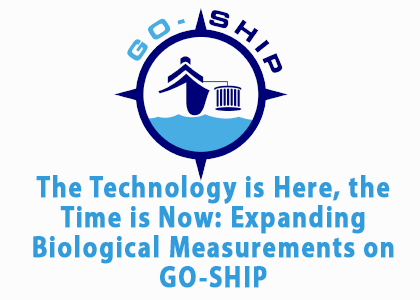The oceanographic community has made great strides over the past couple of decades in developing physical and biogeochemical observing capacity. However, a more holistic understanding of marine ecosystem function and change will require more large-scale, sustained ocean biological and ecological observations. The time for such an integrated approach is now. With new instruments and sensors, we have the capacity to incorporate measurements of biological Essential Ocean Variables (EOVs) (e.g., biological standing stock, diversity, biological rates and fluxes) into existing observing programs and platforms. In particular, rapid advances in imaging, acoustics, and genomic sensing as applied to biological and ecological system functioning have made it feasible to incorporate these measurements into current sustained observing efforts such as the Global Ocean Ship-based Hydrographic Investigations Program (GO-SHIP) with minimal impact on established operations. Broadening these global programs to include biological traits will fill critical knowledge gaps pertaining to marine ecosystem function and enhance our predictive capacity for more effective policy making and management of coastal and marine systems.
Following on detailed recommendations from SCOR Working Group 154 for the addition of plankton measurements to the GO-SHIP program, along with discussions that took place during the OceanObs19 Meeting (September 16-20, 2019, Honolulu, HI), there is strong momentum in the oceanographic community to pursue a comprehensive biological measurement program for US GO-SHIP. Building and implementing this measurement program will require robust leadership and a sustained effort from a small group of scientists. Given the career-enhancing potential of this leadership opportunity, we especially encourage early career scientists. The technology is well tested and available, and with mentorship from SCOR WG 154 members, this team of scientists will make transformative contributions to the field of oceanography. We need scientists who have or are developing expertise in:
- Plankton genetics
- Plankton imaging
- Flow cytometry (of both live and fixed samples)
- Bio-acoustics (current profilers (ADCPs) and quantitative echo-sounders)
- Bio-optics, including related chemical analysis (HPLC and POC)
Planning for the next phase of US GO-SHIP is well underway and will include submission of renewal proposals to federal funding agencies in early 2020, which represents a timely and important opportunity to augment this program with a suite of biological measurements. If you are a US scientist who is interested in contributing to this effort, please fill out this short Google form AND submit an abridged 2-page (NSF-style) CV to hbenway@whoi.edu by November 10.
Best wishes,
Heather Benway (Woods Hole Oceanographic Inst.), OCB Project Office Exec. Officer
Emmanuel Boss (Univ. Maine), SCOR WG 154 Co-Chair
Lynne Talley (Scripps Inst. Oceanography), US GO-SHIP Co-PI





